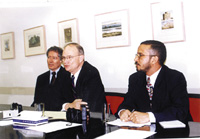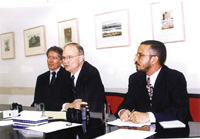
Ambassador Robert Pelletreau Holds a Press Conference at the US Embassy [Archives:2000/22/Local News]
May 29 2000
Hisham Al-Qubati
Ambassador Robert H. Pelletreau, former Assistant Secretary of State for Near Eastern Affairs, 1994-1997 arrived in Sanaa on Monday May 22, as the official representative of the United States Government to the celebration of the 10th anniversary of Yemen Unity.
During his official visit to Yemen, Mr. Pelletreau called on PM, Dr. Al-Iryani and a number of ministers and heard from them of the many achievements that have taken place recently in

Mr. Pelletreau said that he was impressed by the number of international delegations which were present and the excellent organization which the government of Yemen demonstrated throughout the entire ceremony. He also expressed the United States’ support to Yemen in various fields. “The United States supports the Unity of Yemen as the best way to ensure peace and security in the region. The United States supports the peaceful resolution of outstanding border disputes. The United States supports democracy in Yemen. The United States supports the efforts which the government of Yemen is making to confront the challenges of development and especially the economic reform program of the government, the close-working relationship with the World Bank, the preparations which are being made for negotiations to join the World Trade Organization, and the new emphasis which is being placed on the private sector,” he said.
In response to the YT’s questions Mr. Pelletreau refuted reports of vested American military interests in Yemen. He said that the US occasionally had visits to Yemen and had a program of cooperation which was primarily in the field of demining, humanitarian donations in addition to having a training program for officers of the Yemeni Armed forces to receive training in the US.
On the subject of an American anti-terrorism training facility in Sanaa, he said that terrorism was one of the subjects discussed when President Saleh was in the US and it was agreed that there was the possibility of improving cooperation between the two countries in that domain. “We will continue to consider ways to improve our cooperation,” he added.
About the border dispute between Yemen and Saudi Arabia he said that the Us supported a peaceful resolution of border disputes. He further, said that he was impressed with the size and importance of the delegation from the Kingdom of Saudi Arabia, hoping that it would signal a recognition on both sides that more progress needed to be made faster to resolve the border dispute.
Regarding press freedom he said that the US supported the freedom of the press. At the same time he indicated that the press on its side must play its role responsibly and in a professional manner so that the press is a source of true information and genuine problem opinion expressed by its own editorial board.
When asked about the Yemeni government’s refutation of 80% of the States Department human rights report, Mr. Pelletreau said that the US took great care in the preparation of the human rights reports. However, he said that no government in the world would agree 100% with the human rights report in their countries.
On the other hand, he said that the US supported reconciliation and that the US would support the participation of all political parties, those who do not espouse violence. “All such parties, it seems to me, should participate in national elections. Not just a right of the parties, but a duty,” he said. About the parties outside Yemen he said that there should be ways that they could eventually return and participate. However, he said that it was a decision that the Yemeni people themselves must make, the Yemeni government must make.
——
[archive-e:22-v:2000-y:2000-d:2000-05-29-p:./2000/iss22/ln.htm]


